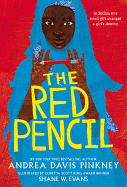
Around the world, 12-year-olds have the same urgent desire: to grow up. Amira, a girl in a small farming village in Darfur in 2003, is no different. Andrea Davis Pinkney (Hand in Hand) gives her heroine a strong voice full of love for family and for Darfur, as in this verse: "Goz is my place to be./ I'm at home in so much sand./ Ya, goz./ Where my new twig/ and I/ wander, wander, wander."
Amira's day is filled with chores and family, punctuated by moments to sketch in the goz (sand) with her "turning-twelve twig." Her life is happy and full, except for how badly she wants to go to school. Her mother won't allow it. At first, Amira's biggest concern is finding a way to change her mother's mind. But then the Janjaweed, a violent militia, attacks her village, killing her father and driving her remaining family to a refugee camp. There Amira receives the titular red pencil, and dreams about how she might find a different life.
Pinkey's elegant and simple free verse allows readers to identify first with Amira's frustration with her parents and, later, her fear in the camp. Though the book is not overly violent, younger children might be scared by the raid scene and by the life Amira and her family are forced to live thereafter. However, Pinkney handles these issues skillfully, making the book a good one for discussion. Evans's drawings are in perfect sync with Pinkney's words, making the book appropriate for readers at many levels. --Stephanie Anderson, head of readers' advisory at the Darien Library and blogger

